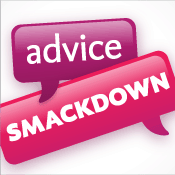
Prescription vs. Over-the-Counter Prenatal Vitamins
Hi Amy!
I am currently in week #12 of Project Incubation. This is my second baby. When I was pregnant 2+ years ago my doctor prescribed my prenatal vitamins. Some fancy schmancy pills that cost me $60/month because my insurance didn’t cover the brand. I figured the baby’s health was worth 2 bucks a day. PLUS, I was sure these pills were far superior because they were expensive which logically equates to better. GO USA!
 This time my doctor told me the over the counter store brand vitamins I was taking before my first appointment are just fine. What gives? My brain tells me that the basic content of both brands is probably equal, but what about the special fish oil/DHA/Omega3 bells and whistles from last time? Am I dooming baby #2 to live in big brother’s brainy shadow for the rest of his/her life? Can 10 cent vitamins really equal the benefit of the two buckers?
This time my doctor told me the over the counter store brand vitamins I was taking before my first appointment are just fine. What gives? My brain tells me that the basic content of both brands is probably equal, but what about the special fish oil/DHA/Omega3 bells and whistles from last time? Am I dooming baby #2 to live in big brother’s brainy shadow for the rest of his/her life? Can 10 cent vitamins really equal the benefit of the two buckers?
J
Like you, my doctor gave me a prescription for my prenatals during my first pregnancy. They cost $30 a month and made me terribly ill, so for the first three months I could not even keep those pricey pills down on a regular basis. My doctor suggested switching to an over-the-counter (OTC) brand, which I did. (After a little trial-and-error — the first bottle I purchased were foul-smelling tablets the size of quarters that I couldn’t even swallow. I went with a nice coated caplet next.) Neither vitamin option featured the extra Omega-3s or DHA, because I guess FIVE WHOLE YEARS AGO is officially the Pregnancy Dark Ages now. I eventually switched back to the prescription version once the nausea abated because, like you, I just assumed they HAD to be “better.”
For my second pregnancy, he wrote me a prescription again but point-blank told me NOT to feel pressured to use it. He said something along the lines of prescription versions being “fancy” now (since the brand he recommended included two separate pills: a multi and a DHA supplement), but that it was entirely possible to get all those benefits from OTC versions. Since he knew my struggles with morning sickness, he mostly advised me to take whatever I could keep down, provided I included some folic acid. “Take a Flintstones if you have to,” he said.
The prescription version was again $30 a month, and after adding up the cost of a regular OTC prenatal AND the DHA supplement (not to mention the convenience of Target Pharmacy’s auto-fill and reminder service), the difference was negligible. The new brand didn’t make me sick like the first time, so I stuck with the prescription version until I ran out of refills sometime around three months postpartum. At that point I switched to the OTC version for the remainder of my breastfeeding months.
If I’d been paying the full out-of-pocket price for those “fancy” pills month after month, you betcha I would have probably gone with the OTC version, with my doctor’s blessing, the second time around. But I remember standing in Whole Foods during my first pregnancy, contemplating a good half-dozen prenatal vitamin options, staring blankly at the labels in paranoid terror because what if I chose the wrong one? The ones from the pharmacy seemed…easier, safer. Pregnancy-medical-establishment approved. What if these other ones were made by cheap off-the-grid hippies who think the government is tracking us through iron supplements?
(An important note: I somehow made it through my first pregnancy without an iPhone. There was no Googling in the grocery store! IT WAS MADNESS!)
So what really makes a “good” prenatal vitamin? According to WebMD, it should contain about the following:
400 mcg of folic acid
400 IU of vitamin D
200 to 300 mg of calcium
70 mg of vitamin C
3 mg of thiamine
2 mg of riboflavin
20 mg of niacine
6 mcg of vitamin B12
10 mg of vitamin E
15 mg of zinc
17 mg of iron
So the big difference, usually, between prescription vs. OTC vitamins is the amount of folic acid. 400 to 600mcg is generally what you’ll see in an OTC version, while the prescription pills sometimes contain up to 1000mcg. There’s not really any evidence that 1000mcg of folic acid is really “better” than the recommended minimum, and the truth is that sometimes expensive vitamin supplements simply mean expensive pee, as your body filters out whatever is in excess of your actual need. 1000mcg of folic acid is actually considered to be the absolute upper limit of “tolerable intake,” which might explain why many women complain that prescription prenatals make them feel sick. But this is usually why women chose to stick with prescription versions, if they’re holding up the labels and doing a straight line-by-line comparison.
But if you look at the label on your OTC prenatals and see that they meet or exceed the amounts WebMD recommend, you are very likely *just fine.* Most of us try to up our folic acid intake anyway, through our diet. Leafy greens, orange juice, lentils, beans, whole wheat breads — if you’re eating a lot of healthy foods, chances are you are making up for the folic acid difference between the supplements.
As for the Omega-3s and DHA, those are absolutely available without a prescription as well, and in special formulations for pregnant and nursing moms.
Honestly, the ONLY REALLY IMPORTANT THING about prenatal vitamins is that you TAKE THEM. If they are making you sick or becoming a financial hardship, you might not take them. Which is bad. If switching to another brand, for whatever reason, makes it easier for you to take them every day, then whatever. By taking prenatals every day, you’re giving your baby a healthy start in life, even if you opted to save a few bucks and a trip to the pharmacy.
********
If you’re looking for ideas and recommendations for a baby registry, don’t miss our Baby Registry Checklist.
If you’re considering an online baby registry, we recommend our affiliate Amazon’s Baby Registry, which offers free 90-day returns on baby store purchases. You can even add items from other websites onto to your baby registry.


